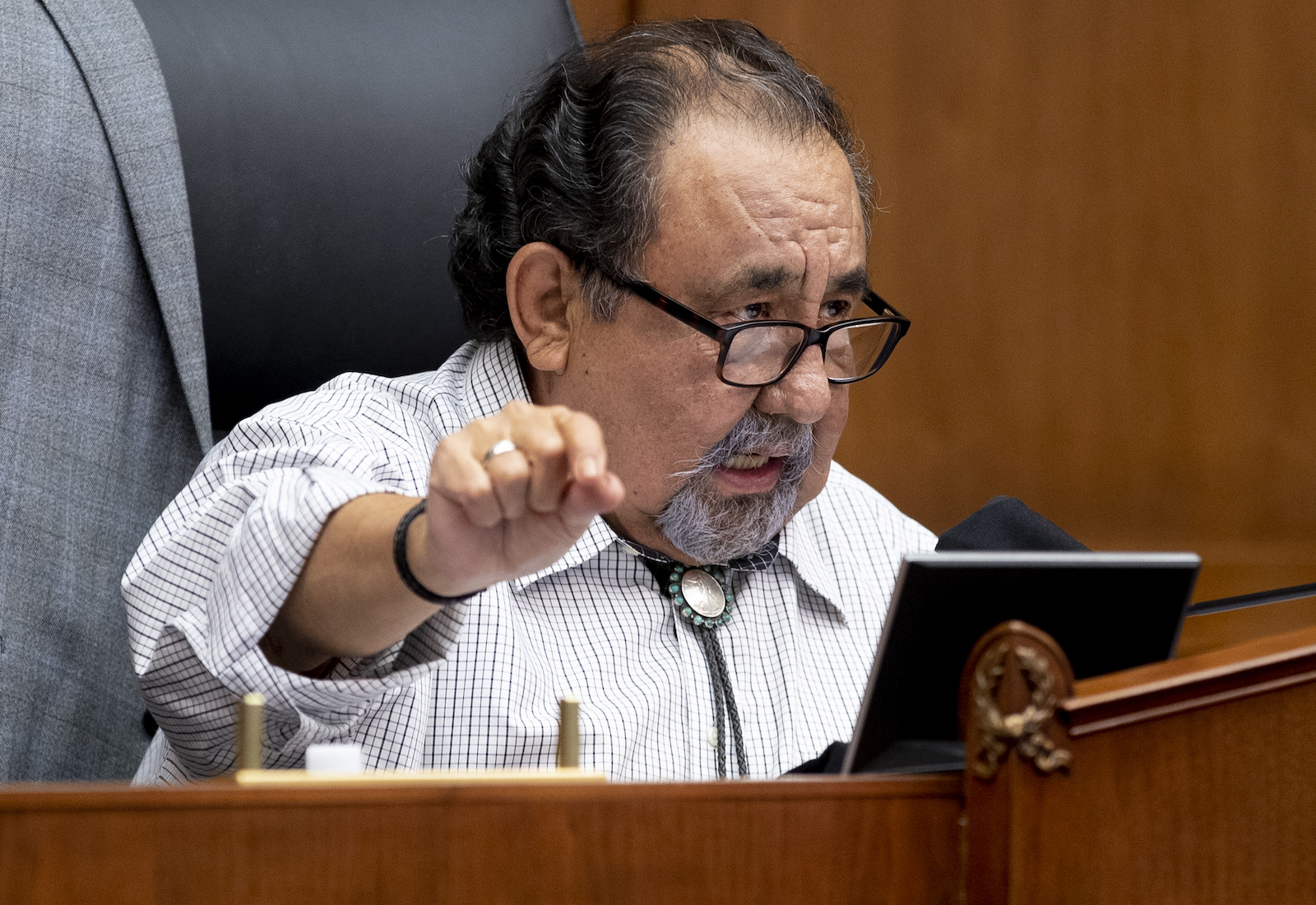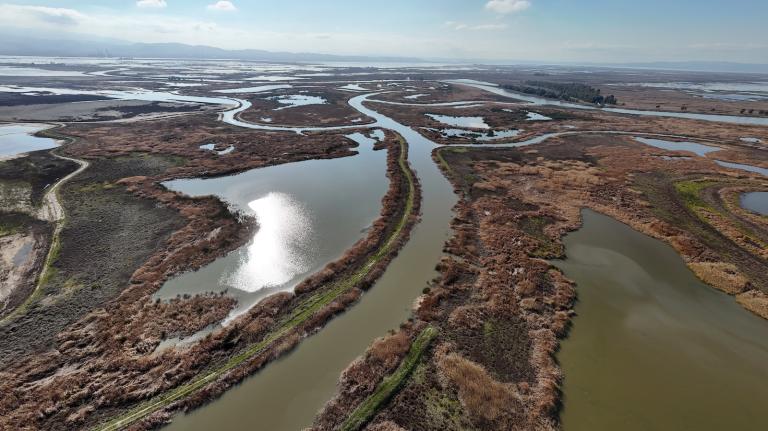At the height of the COVID-19 pandemic last year, the Environmental Protection Agency under the Trump Administration announced a policy that relaxed federal environmental monitoring and reporting requirements for polluting industries across the country. The March announcement meant that the agency, which is charged with enforcing the country’s environmental laws, wouldn’t likely seek penalties from facilities who failed to monitor or report regulatory violations due to the pandemic.
By later in the spring, research was already showing a connection between elevated COVID-19 death rates and air pollution, and a national coalition of environmental justice organizations challenged the policy. Earlier this year, new research confirmed the coalition’s fears. The study, conducted by two American University scholars, found that counties with more industrial facilities that release toxic chemicals experienced increases in air pollution after the rollback of federal environmental enforcement. The study also found that increased pollution led to large and statistically significant increases in COVID-19 cases and deaths, and that the increased pollution exposure was more severe in those counties with a greater number of Black residents.
Now, in an effort to address long-standing systemic environmental inequities as well as the implications of the 2020 EPA decision to relax enforcement of the country’s environmental protection laws, the House Committee on Natural Resources is leading an effort to hold congressional hearings that would publicly acknowledge and examine the effects of that decision. The ultimate goal is to promote legislative solutions that tackle the cumulative effects of environmental injustices that have been magnified in vulnerable communities during the public health crisis.
“What just happened is an abject example of something that happens and has happened historically far too many times,” Democratic U.S. Representative and Committee on Natural Resources Chair Raúl M. Grijalva told Grist. “We need to codify into law the protections and the rights that communities will have moving forward.”
While the Natural Resources Committee is preparing to hold hearings, Grijalva said that ultimately his goal is to move toward joint House committee hearings to encourage broad participation on issues that cut across multiple federal agencies. “We’re working with our counterparts on other committees,” he continued, ”to see how we can collaborate around a congressional response to these concerns about cumulative impacts, civil rights protections, environmental concerns, and now the issue of enforcement and accountability.”
Last year, a coalition of environmental groups called the EPA decision reckless, filed a lawsuit, and asked the agency to issue an emergency rule requiring those polluters who took advantage of the relaxed standards to submit written notice to the EPA — and for that information to be made public. The court, however, found that the groups had no legal standing to move forward with the lawsuit.
Last month, a coalition of some of those same organizations, in partnership with the Vermont Law School Environmental Justice Clinic, issued a report calling for public transparency around the implementation and effects of this policy, which was in place for more than five months as COVID-19 cases skyrocketed among Indigenous tribes, communities of color, and in low-income areas across the country, many of which have borne the brunt of environmental degradation for decades.
Jose Bravo is the executive director of the San Diego-based Just Transition Alliance, a national coalition of environmental justice organizations and labor unions that was one of the plaintiffs in the lawsuit and a member of this coalition. Bravo told Grist that understanding how the EPA’s relaxed standards affected air pollution levels and other types of contamination is paramount to understanding how much of an impact the policy had on vulnerable communities. “It is very hard to see, because everybody left their post,” he said.
The report, titled Federal Dereliction of Duty: Environmental Racism under COVID-19, calls for an audit by the EPA Office of Inspector General and for Congress to investigate the effects of the EPA’s rollback through congressional hearings. Additionally, the report calls on Congress to pass several federal environmental justice bills, including the Environmental Justice for All Act, to protect the civil rights of vulnerable communities.
Grijalva and his fellow Democratic representative, A. Donald McEachin of Virginia, introduced the act in early 2020. Through a collaborative working group process with stakeholders from communities that have historically been over-exposed to environmental hazards, the Environmental Justice for All Act seeks to legislate fairer policies and more open processes at the federal level. Among other protections, the bill requires federal agencies to consider how health effects might compound over time when making permitting decisions under the federal Clean Air and Clean Water acts. The bill would also amend the Civil Rights Act to allow private citizens and organizations that experience discrimination to seek legal remedies when a program, policy, or practice causes a disparate impact.
The EPA established its enforcement pause three days after the American Petroleum Institute requested regulatory compliance relief in a written letter to the agency. Bravo was especially concerned by the agency’s apparent deference to industry, given that many of the communities hardest hit by COVID-19 are areas where residents were already battling high asthma rates and respiratory illnesses due to heavy air pollution.
“For us, it was important that people understand that we just can’t sit here and let these things happen and let communities worsen — let situations of contamination and health effects worsen in our communities — just because the American Petroleum Institute says, ‘please do away with laws,’” said Bravo,paraphrasing the letter. The coalition has continued to press for accountability, he said, out of concern that the policy decision slowed enforcement efforts — and that monitoring has not returned to pre-COVID-19 levels.
In an email response to Grist for comment on the report, an EPA spokesperson said the agency is “committed to vigorously addressing violations and providing tangible benefits to communities impacted by noncompliance.” The spokesperson noted that EPA Administrator Michael Regan has tasked the agency’s Office of Enforcement and Compliance Assurance, or OECA, with increasing federal enforcement in communities that are disproportionately burdened by pollution, as well as resolving cases where polluters didn’t comply with environmental laws through remedies that offer tangible benefits for impacted communities. The OECA is also conducting outreach in local communities regarding enforcement cases in those regions, and providing enforcement program resources to communities across the country.
An EPA Office of Inspector General, or OIG, report on federal regulatory enforcement issued earlier this year found a general decline in enforcement nationally, regionally, and by environmental statute from fiscal years 2007 to 2018. Although it conducted a limited analysis of 2020, the OIG found a similar national decline in enforcement last year. “The decline in compliance monitoring activities meant that, over time, the Agency and the public had less knowledge about compliance by regulated entities and whether facilities emitted pollutants that could be harmful to people,” the report stated. “The associated decline in enforcement actions that include penalties or injunctive relief could mean that the EPA is not adequately addressing violators, who thereby gain an advantage over other regulated entities that comply with environmental regulations.”
Ultimately, the EPA’s actions during the pandemic highlighted two major gaps in the country’s environmental and civil rights law, according to Amy Laura Cahn, visiting professor and director of the Environmental Justice Clinic at Vermont Law School and one of the report’s authors. The first is the lack of a mandate to address the adverse harms that policies such as the EPA enforcement rollback have on vulnerable communities. The second involves the lack of legal redress for individuals and communities who are harmed by entities that receive funding from the federal government and engage in disparate impact discrimination. The Environmental Justice for All Act creates a mechanism to do this work and a process that’s enforceable, she said.
“You take away the deterrents, and unregulated facilities will pollute because they’ve suddenly been permitted to pollute,” Cahn told Grist. “But we need to ensure that communities actually understand what those impacts are in real time.”
While some provisions of the Environmental Justice for All Act, such as funding for urban parks and tribal climate resilience programs, have been incorporated into the congressional budget reconciliation bill, Grijalva said that other key issues have not. For this reason, he says, Congress should still pass the full Act to protect communities from policy decisions that increase environmental hazards. The bill would establish mechanisms that remedy the concerns raised in the Dereliction of Duty report, he added.
“That’s what [the Environmental Justice for All Act is] meant to do,” he said.




